#Articulação dos Povos Indígenas do Brasil
Explore tagged Tumblr posts
Text
#Povos Indígenas#Articulação dos Povos Indígenas do Brasil#Laklãnõ/Xokleng#Lei do Genocídio Indígena#europeus#genocídio#bugreiros#Índios Xokleng#marco temporal#FUNAI
0 notes
Text
Ponto de não retorno, Marina Silva
A ministra do Meio Ambiente e Mudança do Clima, Marina Silva, propôs nesta terça-feira (16) um acordo para evitar que seja alcançado o “ponto de não retorno” de destruição da Amazônia. POLÍTICA LIVRE – 16 de maio de 2023 O Brasil deve defender esse pacto em agosto, durante encontro dos países que integram a OTCA (Organização do Tratado de Cooperação Amazônica). Mateus Vargas – Folhapress “Se a…
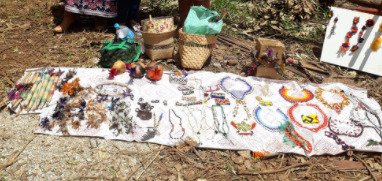
View On WordPress
#Alemanha e Reino Unido#as terras demarcadas têm potencial de produção sustentável e de preservação da floresta#áreas de infraestrutura e agronegócio#Bolívia#Brasil#Colômbia#comunidades indígenas#coordenador-executivo da Apib (Articulação dos Povos Indígenas do Brasil)#destruição da Amazônia. POLÍTICA LIVRE#Equador#EUA#Existe Guarani em São Paulo#Guiana#instalação das primeiras estações de monitoramento de cobertura vegetal na Bolívia#Kleber Karipuna#Marina Silva#Mauro Vieira#ministra do Meio Ambiente e Mudança do Clima#ministro das Relações Exteriores#Noruega#OTCA (Organização do Tratado de Cooperação Amazônica). Mateus Vargas – Folhapress#Peru#presidente Luiz Inácio Lula da Silva (PT)#processo de savanização#promovido pelo Itamaraty#seminário Desenvolvimento Sustentável na Amazônia#Suriname e Venezuela
4 notes
·
View notes
Text
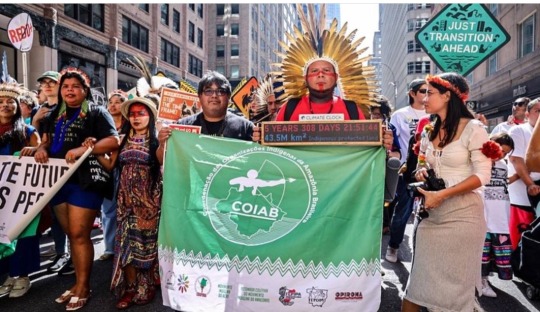
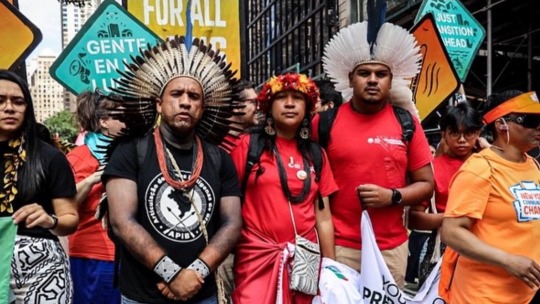
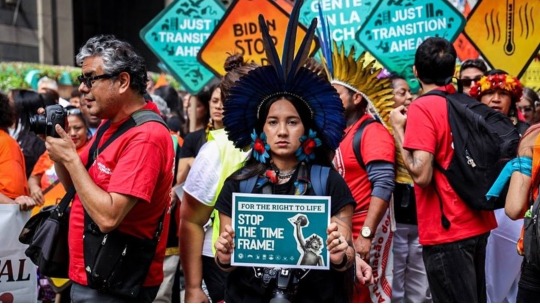
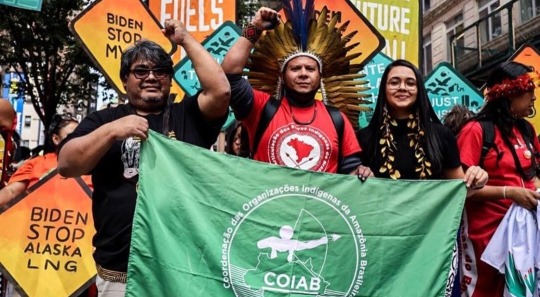
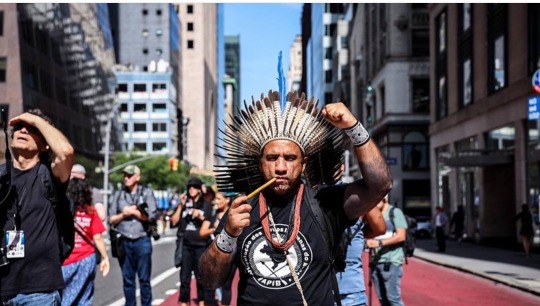
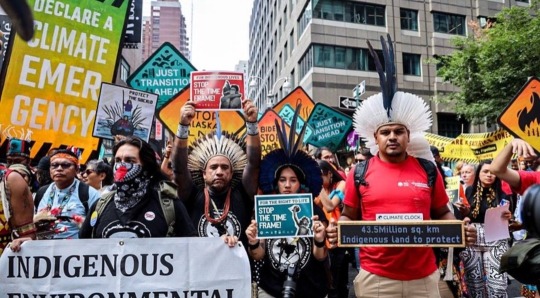
"Trial scheduled for September 20th at the Supreme Federal Court may determine the future of Indigenous Lands in Brazilian territory and be crucial for the global climate. The indigenous movement is mobilizing across Brazil, and an indigenous delegation from Apib is in New York during Climate Week to strengthen the international mobilization campaign in defense of Indigenous Lands rights."
"We are on the land, and the land is within us. If the land dies, we as indigenous peoples die."
The Articulação dos Povos Indígenas do Brasil (Articulation of Indigenous Peoples of Brazil — APIB) is calling for nationwide mobilizations this week and participating in the New York Climate Week to alert the world to the risks of the Supreme Federal Court (STF) judgment scheduled for September 20th. The court will vote on the legitimacy of the legal concept known as the "Temporal Framework," advocated by the Brazilian agribusiness, which could reevaluate Indigenous Land demarcations and impact global climate crisis mitigation efforts.
The Temporal Framework suggests that only indigenous people who can prove they were living on the land in 1988, the same year the Federal Constitution was created, should have rights to the land. This disregards the forced displacements of hundreds of indigenous groups who could only reclaim their traditional lands after Brazil's redemocratization in the late 1980s.
This week, the 15th edition of Climate Week is taking place in New York from September 17th to 24th, alongside the 78th Session of the United Nations General Assembly from September 19th to 23rd, which will feature a speech by President Lula during its opening. A delegation of 10 indigenous leaders is in New York to participate in Climate Week's activities. The international mobilization's goal is to emphasize to the world that the Temporal Framework is a threat to the lives of Brazil's indigenous peoples and could exacerbate the climate crisis, as Indigenous Lands serve as a reservoir of life on the planet.
Apib and its regional organizations are reinforcing mobilizations in territories, cities, and Brasília against the Temporal Framework on September 20th. The goal is to monitor the trial and strengthen the next steps of the indigenous movement's fight. The organizations within Apib mobilized over 220 protests in 21 states, including the Federal District, between May and June.
Five Supreme Federal Court (STF) justices are yet to vote in the trial. The current tally stands at four votes against the Temporal Framework thesis and two in favor. Justices Edson Fachin, Alexandre de Moraes, Cristiano Zanin, and Luís Roberto Barroso have expressed opposition to the agribusiness-backed thesis, while the only favorable votes came from justices appointed by former President Jair Bolsonaro, André Mendonça, and Nunes Marques.
On the same day as the STF vote, the Brazilian Senate attempts to put the Temporal Framework into law. The ruralist caucus in Congress seeks to create tension with the Brazilian judiciary since there is a possibility that the STF may invalidate the Temporal Framework thesis.
In addition to the Temporal Framework, Bill 2903 proposes other setbacks to the rights of indigenous peoples, such as the construction of highways and hydroelectric plants in indigenous territories without free, prior, and informed consent from affected communities. The proposal also aims to allow farmers to enter production contracts with indigenous people, violating the rights of indigenous peoples to the exclusive use of demarcated territories.
While some falsely claim that "there is too much land for too few indigenous people in Brazil," Apib counters that there is too much land for too few farmers and that agribusiness promotes the illegal invasion of indigenous lands. The entity asserts,
"There is no solution to the climate crisis without guaranteeing the rights of indigenous peoples and the demarcation of their territories."
Currently, nearly half of Brazil's land is in the hands of rural producers. Of the total land in the country, 41% corresponds to rural properties, 13.7% to indigenous lands, and 45.2% to other purposes, according to data published in the Official Gazette of the Union. Indigenous Lands are a guarantee of life for indigenous peoples and for all of humanity, which depends on the climate's future.
"As worsening climate crisis unfolds, many will be marked in history as accomplices to the new colonialism threatening the survival of us, indigenous peoples who inhabit the vast territory known as Brazil, and the future of all humanity because there is no solution to the climate crisis without the involvement of indigenous peoples," emphasizes Dinamam Tuxá.
Key activities of Apib during the 15th edition of Climate Week from September 17th to 24th:
On September 17th, Apib participated in the Climate Week march through the streets of New York in support of the Fight Fossil Fuel Strike. The indigenous delegation from Apib denounced the threat posed by the Temporal Framework thesis, highlighted the indigenous emergency situation concerning extractive industries and agribusiness that lead to multiple instances of violence in our territories. Additionally, as part of the Climate Week agenda, it's worth noting that Apib's executive coordinators Kleber Karipuna, Dinamam Tuxá, and other members of the indigenous delegation will participate in a talk on September 19th titled "FCLP: Rights, Participation, and Benefits for Indigenous Peoples and Local Communities in Forest Climate Financing," organized by the Forest and Climate Leaders Partnership. On September 22nd, a portion of the delegation will be present at a dialogue co-organized with H.E Razan Al Mubarak, the current president of the International Union for Conservation of Nature, to assess progress in the COP28 agenda with the aim of collectively identifying meaningful and respectful ways for Indigenous Peoples to engage in the COP.
About APIB
The Articulation of Indigenous Peoples of Brazil (Apib) is a nationally recognized entity within the indigenous movement in Brazil, created from the grassroots up. It brings together seven regional indigenous organizations (Apoinme, ArpinSudeste, ArpinSul, Aty Guasu, Conselho Terena, Coaib, and Comissão Guarani Yvyrupa) and was founded with the purpose of strengthening the unity of our peoples, fostering coordination among different regions and indigenous organizations across the country, as well as mobilizing indigenous peoples and organizations against threats and infringements on indigenous rights.
Support/donate to APIB
APIB Instagram page
APIB Website
#yara.txt#brasil#brazil#latin america#america latina#south america#brazilian politics#brazilian indigenous people#indigenous people#indigenous#native american#native women#first nations#ndn#ndn tag#ndn tumblr#latinoamerica#environmentalism#climate crisis#climate emergency#nature#naturism#naturist#anti capitalism#capitalism#anti colonialism#anti colonization#colonialism#colonization#neocolonialism
188 notes
·
View notes
Text
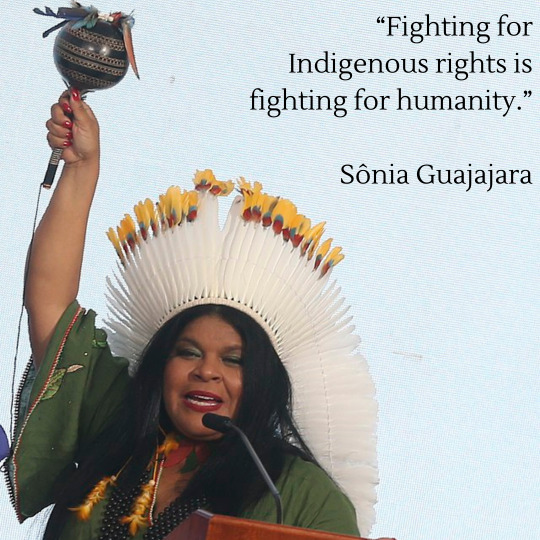
Sônia Guajajara, An Indigenous Trailblazer
Born on March 6, 1974, in the heart of the Amazon rainforest on Araribóia Indigenous Land, Sônia Guajajara embodies resilience, courage, and advocacy for Indigenous rights. She is a member of the Socialism and Liberty Party (PSOL) and has made history as the first Indigenous person to run for a federal executive position in Brazil during the 2018 General election.
As the leader of the Articulação dos Povos Indígenas do Brasil (APIB) (translated as the Articulation of Indigenous Peoples of Brazil, it is a national reference and unifying force within the Indigenous movement in Brazil), Sônia Guajajara represents around 300 Indigenous ethnic groups in Brazil. She fiercely opposes deforestation policies and advocates urgent environmental action, even amidst the challenges posed by the COVID-19 pandemic. Her work at COP26 led to the creation of a $1.7 billion fund for Indigenous peoples and local communities, recognizing their essential role in protecting land and forests from degradation.
In October 2022, she became the first Indigenous woman elected as federal deputy for the state of São Paulo. The same year, Time (magazine) recognized Sônia Guajajara as one of the 100 most influential people in the world. In January 2023, Sônia achieved another historic milestone: she became Brazil’s first-ever minister for Indigenous peoples.
Her leadership is a beacon of hope, challenging the status quo and amplifying Indigenous voices globally.
#sônia guajajara#indigenous#indigenous rights#indigenous women#indigenous people#indigenous peoples#native#natives#brazil#brasil
12 notes
·
View notes
Text
O ativismo da Eliane Potiguara :
As demandas indígenas têm se arrastado de maneira diversificada através dos séculos, desde o primeiro contato com os povos europeus. Muito do que se sabe sobre as formas de resistência à herança colonial passa diretamente pelas mãos das mulheres indígenas, que potencializaram a voz originária ao contribuir para a organização política de seu movimento.
Neste sentido, Eliane Potiguara, desde muito cedo, desenvolveu habilidade para escrita e leitura, que, no processo de ensino-aprendizado, teve grande participação da escola e do conhecimento ancestral de seu povo garantido por sua avó, com quem morava.

Eliane Potiguara é fundadora do GRUMIN – Grupo Mulher-Educação Indígena, de 1988, visto por muitas pessoas como a primeira articulação brasileira de mulheres indígenas. Ela também coleciona diversos prêmios e honrarias pelos feitos realizados ao longo da sua vida – sendo o último o de doutora honoris causa pela UFRJ, que obteve no fim de 2021 –, além de indicações importantes como ao Nobel da Paz, no ano de 2005.
Na busca por melhorias para seu povo, passou por diferentes formas de violência física, moral e psicológica, muitas das vezes com a conivência do estado. Mesmo assim, sempre se mostrou engajada para com as problemáticas indígenas, sobretudo por enfatizar as consequências dos processos de aculturação causados pela influência europeia. Também se dedica a discutir temas que envolvem a invisibilidade da mulher indígena na atual sociedade, que inclusive são debatidos na obra testemunhal Metade Cara, Metade Máscara (2004), o que a coloca como uma das pessoas mais envolvidas com a temática.
fonte : brasil de fato paraíba
#projeto-potiguara#selibi#livros#escritora#literatura#conhecimento#eliane potiguara#escola#projeto escolar
4 notes
·
View notes
Text
Today (12/14/2023) Brazil's National Congress overturned the vetoes made by Lula regarding a bill (now a law) that Indigenous peoples denounce as the "Law of the Indigenous Genocide", the Marco Temporal / Time Frame Law.
According to the pamphlet APIB (Articulação dos Povos Indígenas do Brasil, in English, "Articulation of the Indigenous Peoples of Brazil") made on September of 2023:
Marco Temporal is a legal thesis defended by the Brazilian agroindustry that proposes that only territories occupied by indigenous peoples on October 5, 1988, date of enactment of the Brazilian Constitution, may be legally acknowledged and demarcated. Marco Temporal is a perverse and unconstitutional political and legal interpretation, which ignores that due to centuries of persecution and extermination, many indigenous peoples were expelled from their territories. On June 7, the Federal Supreme Court (STF) resumed the ruling of the Time Frame, related to the case of the Xokleng People and of national application. The Brazilian Supreme Federal Court (STF) is judging the Marco Temporal thesis, an anti-indigenous thesis that restricts the right of Indigenous peoples to the demarcation of their lands. The thesis, considered unconstitutional, states that Indigenous peoples would only be entitled to the demarcation of lands if they were in possession of them on October 5, 1988, the date of the promulgation of the Brazilian Constitution. If accepted by STF, 14% of Brazilian territory and biodiversity living inside the Indigenous Territories would be vulnerable in the face of the expansion of illegal commodity production, land grabbing, illegal mining and deforestation.
The full pamphlet can be read here. More can be read on APIB's page about the Marco Temporal.
The only points that remained vetoed were (source):
The part of the law that would allow contact with voluntarily isolated Indigenous peoples (who have never been in contact with whites/non-indigenous peoples and don't want to be);
The authorization of use transgenics in Indigenous land;
The assertion that part if the cultural "markers" of an Indigenous people have "changed" enough or been "lost" (accordingly to white politicians, legislators, etc) then they have no right to their land.
The last point had been denounced as racist and assimilacionist, and it ignores that Indigenous cultures aren't static (as any culture changes with time, specially under repression) and, of course, that white people don't have the right to decide who is Indigenous or not.
Some of the consequences of the law, according to APIB's pamphlet are:
3. Allow the construction of highways, hydroelectric plants and other enterprises in ILs, without prior, free and informed consent; 4. Authorize farmers to promote direct contracts with indigenous peoples to plant soy, raise cattle, making it possible to promote even illegal and industrial mining in ILs; 5. Allow anyone to question the processes of demarcation of indigenous territories, including those already demarcated; 6. Recognize the legitimacy of land tenure by invaders of Indigenous Lands, facilitating land grabbing;
The results will be felt in the rest of the world as well because the exploitation of the land for cattle, soy, mining, and others are exactly what drives deforestation and the resulting climate catastrophes in the Brazilian biomes such as the Amazon rainforest, the Cerrado, etc. Indigenous people take an active role in protecting such areas.
As the texts says, many Indigenous peoples have been expelled from their land and returned at a later point in time.
The Brazilian Constitution of 1988 came after the Dictatorial Period, which killed around 8000 Indigenous people (of ten studied peoples, while Brazil has around 305 recognized indigenous peoples/ethnicities nowadays) (also consider that some of these ethnicities have at times "disappeared" and "reappeared" times later because people stopped claiming them to avoid violence and racism).
The Indigenous movement in Brazil has declared this to be an Emergency (as they did during the beginning of the Covid-19 pandemic, which affected Indigenous peoples in a disproportionate manner).
They will also register a Ação Direta de Inconstitucionalidade (Direct Action of Unconstitutionality); which is a legal action submitted to the STF that seeks to declare this law as unconstitutional and annul it.
To help them:
Donate:
Sign and share their petition:
For fellow Brazilians (or people who understand Portuguese and want to help), they have a WhatsApp group where they send news regarding the developments and suggest ways to help.
In their pamphlet they also ask for people to help in other ways such as:
Following their social networks (all of them are in Portuguese for now): 1 / 2 / 3 / 4;
"Take photos, videos and share the contents of the indigenous campaign on your social networks" and tag them
"Mobilize authorities, celebrities and influencers"
"Organize protests in front of Brazil’s Embassies, Universities, at the European Parliament, etc."
Most of the movement is articulating itself in Portuguese so it's not something people who aren't familiar with the language can as easily access/read about, but please keep what's happening to Indigenous peoples in Brazil in mind, and help if you can!
#brazil#anti indigenous racism#racism#genocide#txt#stances#idk how else to tag this!!#mari shares#indigenous peoples
3 notes
·
View notes
Text
Apib aciona STF contra lei que altera modelo de ensino no Pará
A Articulação dos Povos Indígenas do Brasil (Apib) acionou o Supremo Tribunal Federal (STF), por meio de uma Ação Direta de Inconstitucionalidade (ADI 7778), para contestar uma lei estadual recente do Pará que alterou aspectos referentes à carreira de professores da rede estadual de ensino. A avaliação da Apib é a de que a incorporação do modelo online em certas regiões pode fazer com que alunos…
0 notes
Text
Ministro Fachin pede informações sobre proteção a povos isolados e de recente contato
A Articulação dos Povos Indígenas do Brasil (Apib) alega que essa população sofre risco real de extermínio devido a ações e omissões do governo federal. Continue reading Ministro Fachin pede informações sobre proteção a povos isolados e de recente contato

View On WordPress
0 notes
Text
O ativismo da Eliane Potiguara :
As demandas indígenas têm se arrastado de maneira diversificada através dos séculos, desde o primeiro contato com os povos europeus. Muito do que se sabe sobre as formas de resistência à herança colonial passa diretamente pelas mãos das mulheres indígenas, que potencializaram a voz originária ao contribuir para a organização política de seu movimento.
Neste sentido, Eliane Potiguara, desde muito cedo, desenvolveu habilidade para escrita e leitura, que, no processo de ensino-aprendizado, teve grande participação da escola e do conhecimento ancestral de seu povo garantido por sua avó, com quem morava.

Eliane Potiguara é fundadora do GRUMIN – Grupo Mulher-Educação Indígena, de 1988, visto por muitas pessoas como a primeira articulação brasileira de mulheres indígenas. Ela também coleciona diversos prêmios e honrarias pelos feitos realizados ao longo da sua vida – sendo o último o de doutora honoris causa pela UFRJ, que obteve no fim de 2021 –, além de indicações importantes como ao Nobel da Paz, no ano de 2005.
Na busca por melhorias para seu povo, passou por diferentes formas de violência física, moral e psicológica, muitas das vezes com a conivência do estado. Mesmo assim, sempre se mostrou engajada para com as problemáticas indígenas, sobretudo por enfatizar as consequências dos processos de aculturação causados pela influência europeia. Também se dedica a discutir temas que envolvem a invisibilidade da mulher indígena na atual sociedade, que inclusive são debatidos na obra testemunhal Metade Cara, Metade Máscara (2004), o que a coloca como uma das pessoas mais envolvidas com a temática.
fonte : brasil de fato paraíba
#projeto-potiguara#selibi#eliane portiguara#indigenas#escola#conhecimento#livros#escritora#literatura
1 note
·
View note
Link
0 notes
Text
Marco Temporal: Povos Indígenas deixam Câmara de Conciliação do STF
Articulação dos Povos Indígenas do Brasil (Apib) anunciou sua saída da Câmara de Conciliação do Marco Temporal no Supremo Tribunal Federal (STF). Advogada ouvida pelo Vocativo relata clima de pressão e intimidação por parte de autoridades contra indígenas
A Articulação dos Povos Indígenas do Brasil (Apib) anunciou nesta quarta-feira (28/08/2024) sua saída da Câmara de Conciliação do Supremo Tribunal Federal (STF), que discute a Lei do Genocídio Indígena (Lei 14.701/2023). Em conjunto com suas sete organizações regionais de base, a Apib afirma que os povos indígenas não irão negociar o marco temporal e outras violações contra os direitos indígenas,…
0 notes
Text
Ataque Armado Contra Indígenas Guarani Kaiowá em Mato Grosso do Sul
No último sábado (3), um grupo armado realizou um ataque violento contra indígenas Guarani e Kaiowá na Terra Indígena Lagoa Panambi, localizada em Douradina, Mato Grosso do Sul. O Conselho Indigenista Missionário (Cimi) e a Articulação dos Povos Indígenas do Brasil (Apib) denunciaram o ocorrido, destacando a gravidade da situação. Detalhes do Ataque e Vítimas Segundo informações do Cimi deste…
0 notes
Text
Acampamento Terra Livre 2024
Facebook O Acampamento Terra Livre (ATL), a maior Assembleia dos Povos e Organizações Indígenas do Brasil, acontece desde 2004, por regra todo mês abril e em Brasília – DF, e excepcionalmente em outro mês e outra unidade da Federação, a depender da análise conjuntura nacional e da situação dos direitos indígenas e das deliberações dos dirigentes e das organizações de base do movimento indígena.…

View On WordPress
#2004#2010 Campo Grande MS#2012 Rio de Janeiro Cúpula dos Povos durante a Rio+20#Acampamento Terra Livre 2024#análise conjuntura nacional# Acampamento Terra Livre (ATL)# Conselho Nacional da Política Indigenista (CNPI)#criação da Articulação dos Povos Indígenas do Brasil (APIB)#Existe Guarani em SP São Paulo#lutas continuadas significativas conquistas#maior Assembleia dos Povos e Organizações Indígenas do Brasil#mês abril Brasília DF unidade da Federação#novembro 2005#participação de representantes dos povos indígenas em instâncias ou colegiados#Política Nacional de Gestão Ambiental e Territorial das Terras Indígenas (PNGATI)#promoção e efetivação dos seus direitos fundamentais#Secretaria Especial de Saúde Indígena (SESAI)#situação dos direitos indígenas e das deliberações dos dirigentes e das organizações de base do movimento indígena
0 notes
Text
A professora de música da rede municipal de educação de Florianópolis, Cláudia Roberta Yumiko Tristão, que leciona na Escola Básica Municipal Virgílio dos Reis Várzea, acaba de lançar um material didático que se refere a cultura indígena, com ênfase no povo Mbya-Guarani. O material aborda os elementos culturais do povo Mbya-Guarani da comunidade Itaty, que são apresentados em projetos criativo-musicais que incluem histórias, cantos e artesanias. O processo de produção teve como relação a interculturalidade, em uma elaboração de diálogo com a comunidade da Escola Indígena Itaty e do grupo de canto e dança Tape Mirim, da Terra Indígena Morro dos Cavalos em Palhoça, Santa Catarina. A professora conta que o objetivo foi de formar um material que pudesse auxiliar os professores, principalmente da educação musical, de escolas básicas que não são indígenas. “É importante estabelecer pontes de contato com outras culturas, possibilitar trocas, proporcionar possibilidades de ampliação da capacidade de compreender o mundo, dos estudantes na escola básica, considerando que as crianças estão em desenvolvimento, construindo seus modos de ver e estar no mundo”, afirma Cláudia. A ideia por trás do projeto A professora Cláudia conta que a ideia surgiu da própria dificuldade como professora de educação musical devido à falta de material da área. A oportunidade de elaborar uma proposta pedagógica surgiu do trabalho de conclusão do mestrado de Cláudia. “Teve base na articulação entre as vivências na escola indígena e na comunidade, na escola não indígena, em estudos sobre a legislação da educação para as relações étnico-raciais (ERER), em materiais didáticos elaborados pelos professores das escolas do povo Guarani em parceria com a Universidade Federal de Santa Catarina (UFSC)”, segundo ela. O material foi composto durante o curso de mestrado profissional na Universidade do Estado de Santa Catarina (UDESC), entre 2018 e 2020, sob a orientação da professora Viviane Beineke. Também foi amparado na Lei nº 11.645/2008, que determina a obrigatoriedade do estudo da história e da cultura dos povos Indígenas do Brasil na educação básica. Acesso ao material didático A proposta pedagógica está acompanhada de um texto que apresenta as trajetórias e o suporte teórico que embasaram o caderno didático, com objetivo de refletir sobre o processo de elaboração deste material. O material é gratuito e está disponível para download no seguinte link: https://www.udesc.br/ceart/inventa/publicacoes/didatico O secretário municipal de Educação, Maurício Fernandes Pereira, acredita que o material é de suma importância para o aprendizado de diferentes culturas. “Quanto mais nossos estudantes puderem descobrir e entender outras formas culturais, mas eles terão a capacidade de respeitá-las. Isso nos leva a uma melhor convivência em sociedades das futuras gerações”. galeria de imagens Fonte: Prefeitura de Florianópolis
0 notes
Text
Indígenas retomam protestos contra governo Lula por demarcação de terras
Foto: Agência Brasil A Articulação dos Povos Indígenas do Brasil (Apib) realizou uma assembleia extraordinária na última segunda-feira (8) para discutir a falta de demarcação de terras indígenas e agendou uma série de protestos contra o governo Lula (PT) e o Supremo Tribunal Federal (STF). Esses atos devem começar nesta quarta-feira (10), com lideranças indígenas expressando frustração com a…
0 notes
Text
Força-Tarefa para Demarcação de Terras Indígenas
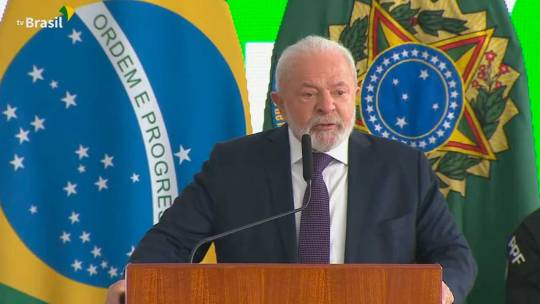
O presidente Luiz Inácio Lula da Silva recebeu um grupo de 40 lideranças indígenas no Palácio do Planalto, como parte das atividades da 20ª edição do Acampamento Terra Livre (ATL), a maior mobilização indígena do Brasil. A reunião ocorreu após uma marcha que mobilizou milhares de indígenas pela área central da cidade até a Praça dos Três Poderes. Em resposta à principal reivindicação do grupo, foi anunciada a criação de uma força-tarefa governamental para destravar processos de demarcação de terras pendentes de homologação presidencial, priorizando quatro áreas contestadas: Morro dos Cavalos e Toldo Imbu (SC), Potiguara de Monte-Mor (PB) e Xukuru Kariri (AL). A ministra dos Povos Indígenas, Sônia Guajajara, enfatizou que questões políticas também precisam ser enfrentadas, considerando a ocupação não-indígena nesses territórios. A força-tarefa será coordenada pela ministra em conjunto com diversos órgãos governamentais, incluindo a Secretaria-Geral da Presidência da República, Ministério da Justiça e Segurança Pública, Ministério do Desenvolvimento Agrário e Agricultura Familiar, Advocacia Geral da União (AGU) e a Fundação Nacional dos Povos Indígenas (Funai). O governo enfrenta desafios legais e políticos nas demarcações, incluindo a presença de pequenos agricultores em áreas como Paraíba e Alagoas. Dinamam Tuxá, coordenador-executivo da Articulação dos Povos Indígenas do Brasil (Apib), ressaltou a importância da força-tarefa para superar esses entraves e avançar nas demarcações em todo o país. Após o encontro, o presidente Lula destacou o papel das mulheres indígenas na política indigenista do país, mencionando a ministra Sônia Guajajara e a presidente da Funai, Joênia Wapichana, em suas redes sociais. Ele reiterou seu compromisso em garantir os direitos dos povos indígenas e minimizar seu sofrimento. O 20º ATL continua com uma série de atividades culturais e políticas até esta sexta-feira, com a participação de cerca de 10 mil indígenas, marcando um dos maiores eventos já realizados em Brasília dedicados à causa indígena. Com informações da Agência Brasil. Read the full article
0 notes